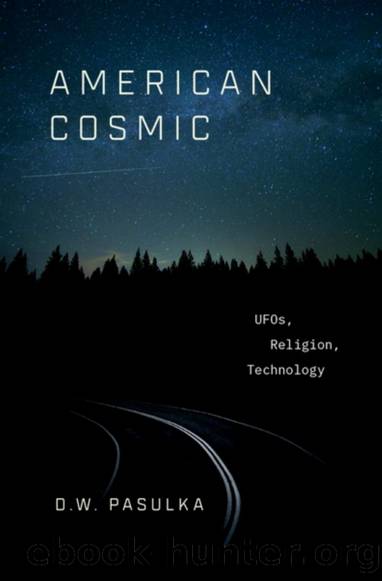American Cosmic: UFO's, Religion, Technology by D.W. Pasulka

Author:D.W. Pasulka [Pasulka, D.W.]
Language: eng
Format: epub
ISBN: 9780190692889
Google: jtc7swEACAAJ
Goodreads: 38819245
Published: 2018-10-16T13:49:31+00:00
A N E W F O R M O F R E L I G I O N
As a professor of religion, I am often asked to present my
research to community groups. On one occasion, I gave a
presentation on the interpretation of aerial phenomena in
several religious traditions. There were about fifty people
in attendance. Toward the end, I mentioned the religion
Jediism, which is inspired by the Star Wars franchise.
Usual y when I speak of Jediism, people laugh, and this
occasion was no different. For the record, I do not laugh
at any religious tradition. After the presentation was over
I was approached by a man and his son. He waited until the
people around me dispersed, and then he told me that he
was a practitioner of one of the religious traditions I had
mentioned.
âBuddhism?â I asked.
âNo.â
âChristianity?â
âNo.â
I then immediately knew he was a Jedi, and I felt bad the
audience had laughed when I had mentioned his religious
tradition.
âYou are a Jedi!â I exclaimed.
He smiled proudly. He was a Jedi Knight.
Star Wars characters not only inhabit our virtual land-
scape but also have inspired a religious movement. In 2002,
I became aware that a group of people had claimed Star Wars
as their religion on a census in the United Kingdom, as a
joke. I used this as an example to show my students that de-
fining religion is not easy, but I was certain that it wouldnât be relevant in another year. Yet this event, along with other, independent developments, soon became part of a movement
W H E N S TA R WA R S B E C A M E R E A L | 1 37
that endured, and now there are official religious groups
that claim Star Wars as their sacred âscripture.â21 Critics claim that it is not a real religion because it is based on a movie. Religions general y propose truth claims regarding a
transcendent, or supernatural, element. Movies do not. Yet
thousands of practitioners of Jediism believe that there is a
transcendent and supernatural element within Star Warsâ
the Force. Of course, the Force is only one of many themes in
Star Wars movies, but practitioners of Jediism reserve unique autonomy for the Force, apart from its fictional status.
According to Jedi practitioners, George Lucas based the
movies on religious philosophies including Daoism and Zen
Buddhism. Because these are considered religions, and Star
Wars is based on and il ustrates them, it should therefore be considered a type of scripture that, like a finger pointing to
the moon, refers to eternal and transcendent truths. Thus,
practitioners of Jediism place their fiction- based religion
within a category reserved for traditional religions.
David Chidester, Carole Cusack, and Markus Alteena
Davidsen have all studied new religious movements based
on movies, science fiction, and other nontraditional
inspirations. According to Chidester, âfakelore or fake reli-
gion, although invented, mobilized, and deployed by frauds,
can produce real effects in the real world.â22 In a more gen-
erous vein, Cusack argues, âStudying religions that openly
advertise their invention not only enriches what we know
about traditional religions, but sheds light on how science
fiction speculations and new technologies inform religious
belief and practice.â23 She also notes that invented religions
il
Download
This site does not store any files on its server. We only index and link to content provided by other sites. Please contact the content providers to delete copyright contents if any and email us, we'll remove relevant links or contents immediately.
| Ancient & Controversial Knowledge | Ghosts & Hauntings |
| Hermetism & Rosicrucianism | Magic Studies |
| Occultism | Parapsychology |
| Supernatural | UFOs |
| Unexplained Mysteries |
Animal Frequency by Melissa Alvarez(4463)
Sigil Witchery by Laura Tempest Zakroff(4238)
Real Magic by Dean Radin PhD(4121)
Fingerprints of the Gods by Graham Hancock(3996)
Aleister Crowley: The Biography by Tobias Churton(3634)
Journeys Out of the Body by Robert Monroe(3619)
Alchemy and Alchemists by C. J. S. Thompson(3516)
The Rosicrucians by Christopher McIntosh(3513)
Mysteries by Colin Wilson(3448)
Hitler's Monsters by Eric Kurlander(3329)
The Hatha Yoga Pradipika (Translated) by Svatmarama(3329)
Wicca: a guide for the solitary practitioner by Scott Cunningham(3167)
John Dee and the Empire of Angels by Jason Louv(3163)
Infinite Energy Technologies by Finley Eversole(2975)
Book of Life by Deborah Harkness(2933)
Dark Star Rising by Gary Lachman(2865)
The Book of Lies by Aleister Crowley(2842)
Aliens by Jim Al-Khalili(2827)
To Light a Sacred Flame by Silver RavenWolf(2814)
